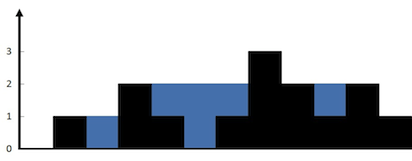Trapping Rain Water
42. Trapping Rain Water
Given n non-negative integers representing an elevation map where the width of each bar is 1, compute how much water it can trap after raining.
Example 1:

Input: height = [0,1,0,2,1,0,1,3,2,1,2,1]
Output: 6
Explanation: The above elevation map (black section) is represented by array [0,1,0,2,1,0,1,3,2,1,2,1]. In this case, 6 units of rain water (blue section) are being trapped.
Example 2:
Input: height = [4,2,0,3,2,5]
Output: 9
Constraints:
-
n == height.length -
1 <= n <= 2 * 104 -
0 <= height[i] <= 105
Analysis
We can use the monotonic stack to resolve the problem. We use a stack named s which store the unresolved index,
- we compare the current height
height[i]with the top of stacks[-1]. Ifheight[i] > s[-1], it means we cound find a target trap, we can pop the index from the stack twice and calculate the trap area; then continue the next round until one of bellow condition meet:- The stack is empty
- The height of stack’s top is bigger than
height[i]
- If it’s less, then we should just push the current index.
Solutions
1. Monotanic-Stack
class Solution:
def trap(self, height: List[int]) -> int:
s = []
ans = 0
for i, h in enumerate(height):
while s and h >= height[s[-1]]:
b_h = height[s.pop()]
if not s:
break
left = s[-1]
dh = (min(h, height[left])) - b_h
ans += dh * (i-left-1)
s.append(i)
return ans
Input: [0,1,0,2,1,0,1,3,2,1,2,1]
output:
6
Complexity
- Time complexity: ( O(n) ), where ( n ) is the length of the array.
- Space complexity: ( O(n) ), where ( n) is the length of the array.
2. Prefix-Sum
class Solution:
def trap(self, height: List[int]) -> int:
n = len(height)
pre_max = [0] * n
pre_max[0] = height[0]
for i in range(1, n):
pre_max[i] = max(pre_max[i-1], height[i])
suf_max = [0] * n
suf_max[-1] = height[-1]
for i in range(n-2, -1, -1):
suf_max[i] = max(suf_max[i+1], height[i])
ans = 0
for h, pre, suf in zip(height, pre_max, suf_max):
ans += min(pre, suf) - h
return ans
Input: [0,1,0,2,1,0,1,3,2,1,2,1]
output:
6
Complexity
- Time complexity: ( O(n) ), where ( n ) is the length of the array.
- Space complexity: ( O(n) ), where ( n) is the length of the array.


Comments